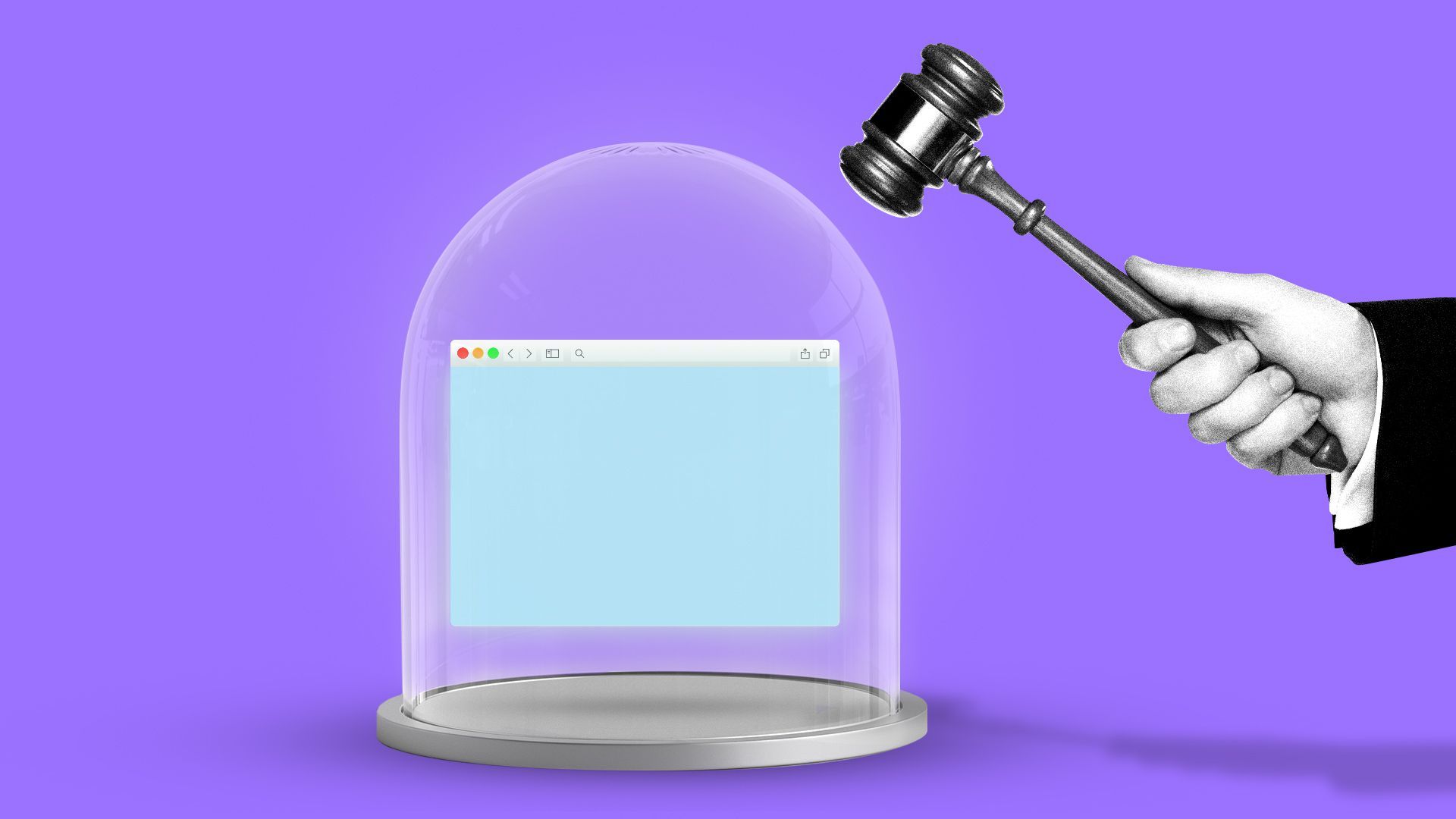Washington's rush to smash tech's liability protection
Add Axios as your preferred source to
see more of our stories on Google.

Illustration: Aïda Amer/Axios
A new Justice Department proposal Wednesday accelerates a headlong charge in Washington to rewrite a law that protects online services from being sued over user-created content.
Why it matters: If Congress approves any of the bills in play, every dispute over content moderation on platforms like Facebook, Google and Twitter could turn into a court case — while the government could find itself with a big new job deciding whether companies like Facebook and Twitter are acting neutrally and "in good faith."
Driving the news: The Justice Department is urging Congress to revise Section 230 of the 1996 Communications Decency Act. That law lets online services post content from users without assuming legal liability for it, as traditional publishers do. The DOJ's proposal would remove that protection if those services...
- ...purposefully facilitate or solicit third-party content that violates federal law.
- ...fail to apply "good faith" in content moderation, meaning they consistently apply their own terms of service and provide "reasonable" explanations of enforcement actions.
- ..."purposefully blind themselves and law enforcement to illicit material." That's a reference to platforms that encrypt users' communications without giving the government access.
The big picture: The DOJ proposals join a raft of other plans to modify Section 230.
- President Trump's May 28 "Executive Order on Preventing Online Censorship" called for narrowing the scope of the law and ordered the Commerce Department to petition the Federal Communications Commission to craft and enforce rules that would narrow the law.
- A bill proposed Wednesday by Sen. Josh Hawley (R-Mo.) would require online platforms to include in their terms of service a pledge of "good faith" and all details of their content moderation policies, then let users who feel wronged sue the firms.
- The EARN IT Act, an earlier bipartisan proposal in the Senate, took aim at child sexual exploitation online and threatened platforms with losing their immunity under Section 230 if they failed to meet government-set standards for preventing abuse.
Between the lines: Most of these proposals are fueled by conservatives' anger at what they view as bias and censorship by the platforms, most prominently Twitter's move to police two of Trump's tweets.
- Perception of such bias is widespread on the right, but evidence remains scarce.
What they're saying:
- "The era of self-regulation for Silicon Valley is over," said Sen. Marsha Blackburn (R-Tenn.). "No longer will we let Big Tech hide behind these liability protections as a pretense to bully competitors or to suppress free speech."
- "The practical effects of the recommendations are to repeal Section 230 because they allow completely unfounded litigation to get past early dismissal," said Neil Chilson, senior research fellow with the Charles Koch Institute and former chief technologist at the Federal Trade Commission. "Given that Section 230 never immunized platforms from federal crimes, the biggest effect is to enable trial lawyers to bring a wide range of cases that they couldn’t before."
- The DOJ proposals "would seriously curtail platforms' ability to moderate content and respond quickly to emerging problems — like new kinds of abusive online behavior, which internet users are endlessly inventive in coming up with," said Daphne Keller, director of the program on platform regulation at Stanford's Cyber Policy Center.
- A Facebook spokesperson: "The Trump administration has said we have censored too much content and Democrats and civil rights groups are saying that we aren't taking down enough. Section 230 allows us to focus on what matters most: fighting harmful content while protecting political speech."
Our thought bubble: Aggrieved users have been demanding "good faith" and consistency from content moderators for as long as we've been online — from today's social networks to blogging platforms, comment sections to discussion forums, bulletin boards to USENET.
- Handing responsibility for resolving these endless queues of contention to the legal system might benefit lawyers and judges, but it's unlikely to satisfy anyone else.
- "It is definitely a full employment act for lawyers. We can litigate this endlessly and still not know for sure what the standards for things like 'good faith' are." Keller says.
The bottom line: The odds aren't good for any of these bills to pass a Congress where each party controls one house. But some of the promoters of rewriting Section 230 may be less interested in enacting a law than in intimidating tech companies.

